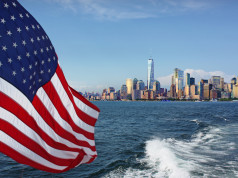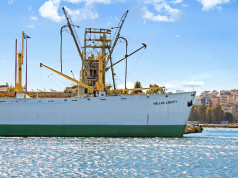Keynote speech delivered by Richard Sadler, CEO Lloyd’s Register, at the annual Donaldson Lecture to the Lloyd’s Market Association, in London, October 25, 2012
I currently sit as the co-chairman of the Marine Industries Leadership Council and CEO of Lloyd’s Register, I am in a privileged position. I have access to senior government officials, business leaders and academics worldwide.
My organisation, Lloyd’s Register, has as its primary role, to minimise operational risk and improve safety for stakeholders across many business sectors; so we have a unique view on the world and the critical infrastructure that supports society. Most importantly, I have no shareholders beyond those who govern my Foundation and they kindly allow me to speak freely about my views on the future of society, government and role of business. During the next 40 minutes, I hope to stir passion, debate and even disagreement.
As most of you have a specific interest in shipping, tonight I will examine the strategic role it plays in support of the global economy, the value it provides to society, and the consequences that will arise if our government fails to treat the maritime supply chain as critical infrastructure and the risks associated with operations and regulations.
I have always been fascinated by the assertion of Martin Stopford, the respected Clarkson analyst, that merchant shipping is the biggest poker game in the world. Since hearing it, I increasingly believe that working out the odds of ensuring consistent prosperity is so difficult that it is more like the game of roulette.
Named after a French diminutive for “little wheel”, roulette allows players to bet on a single number, a range of numbers, red or black numbers, odd or even, or zero. In their casino, ship-owners regularly bet on deploying a single dry fleet, a mixed wet and dry fleet, big ships, small ones, new efficient ships or cheaper second hand ones. The range choices are similar, not least in the uncertainty of their outcomes, and the probable return is as varied.
To determine the winning number and colour, a croupier spins the gaming wheel in one direction and an ivory ball in the other on a tilted circular track which runs around the circumference at the top of the wheel. When the ball loses momentum, it falls into the wheel where one of 37 coloured and numbered slots host the winning bet.
In America they added a 00, which further improved the house odds; draw whatever analogy you like to the Jones Act, or other protectionist activities.
For us, the market is the croupier and the ports and commodities are the slots. Will your bet come good? Who knows? But if the ship-owners of today didn’t possess an incredible collective appetite for a big gamble, the whole world would be different.
In roulette, the odds are designed so that, over time immemorial, the punters will always lose 5.28 cents of every dollar they wager. Let’s hope shipping proves a better bet.
The public-transport community, for whom safety and security are the primary concerns, has certainly improved the odds of safe passage over the years. The number of people in the European Union who died in transport accidents (covering all transport modes) fell 37% between 1999 and 2009, according to Eurostat.
Commercial shipping is showing a similar positive trend, with a high of 1,370 fatalities in 2006 dropping to just 42 last year, according to the IMO.
While those appear to be comforting trends, there is no room for complacency: transport accidents are still the largest single cause of death among people aged 15 to 29. Unlike accidents at sea, in the air, or on the rails, road accidents — due to the comparatively small number of people involved in each incident — tend to receive less public scrutiny, and less public outrage.
But, back to shipping. Given our responsibility to public safety and global commerce, there is little doubt among us that the maritime sector is vital, even if it is largely undervalued by those looking in.
Yet we are here today representing an industry that has been allowed to deteriorate through a lack of vision, investment and support from successive UK Governments. That neglect has slowly eroded the capability of our Royal Navy, our marine cluster and the related supply chain; it has resulted in a weakening of the London finance, legal and insurance communities in its support of the global industry increasingly controlled outside the UK.
Our political leaders appear to have lost sight of the fact that we are an island nation that is totally dependent on the sea for our economic future. They also seem to have lost sight of plenty more, so maybe we shouldn’t feel victimised! Our current Energy supply strategy, particularly nuclear is a good example.
But let’s be clear. What we are witnessing is not the inevitable decline of a sunset industry made redundant by advancing technology.
As an island nation, we will always depend on a strong marine capability. As such, the risk of an eroding marine capability is far greater than its shrinking contribution to GDP. What we are gambling on is the prosperity of our children, and their children. With so much at stake, it is clearly time to improve the odds for them.
Our rich maritime history does not entitle us to an influential role in the future of this vital industry. We are entitled to nothing. Our industries of the past will remain exactly that, unless those we elect give them the long-term state support and encouragement they need to compete on a global level.
Our politicians are increasingly transfixed on the short-term, on local voter and national sensation issues that could affect getting them re-elected. But while they focus on the cosmetic – to be seen to be ‘doing something’ – the long-term challenges are ignored. New tax regimes, strategic infrastructure investments, education and training and incentive schemes to protect our marine supply chains could all help mitigate the risks we face. But first we need our political leaders to recognise the threat posed by their failure to act.
As an island society, we are almost totally dependent upon maritime transport for food and energy supplies. Could there be two more critical commodities?
Forty per cent of the food we consume is imported and, since 2004, the UK has been a net-importer of the energy we need to keep our families warm and our businesses thriving. The trend towards import dependence is growing.
Despite slowing demand for petrol, our dependency on oil and petroleum product imports continues to grow at pace: according to second quarter DECC statistics, we imported 5.5 million tonnes more of those products than we exported, compared with just 3.4 million tonnes a year ago, or a comparative growth of 62% in one year.
This growing dependence on imports is, as I have said, coinciding with an unprecedented erosion of our maritime capabilities, making us captive to the nations who deliver the basic commodities we must have.
Does that sound like a sensible gamble to you … or a reckless punt on a longshot?
Political strategies aside, as a country with a remarkable maritime heritage, I find it sad to witness the UK’s decline. That is why I accepted my role at the Marine Industries Leadership Council. But the more time I spend in this role, the more I come to believe that the short-termism of our electoral system is in itself a strategic risk, especially to long-term, capital and human-intensive industries such as ours
I don’t believe this can be blamed on incompetence. I’m a firm believer that most governments know how to put things right, they just don’t like their chances of being re-elected if they do. So they choose the politically expedient path over one that is right for the majority and for long term sustainability.
As someone who has benefited from a career in shipping, I feel compelled to do what I can to help build the kind of partnerships — particularly between academia, business and government — that can improve prosperity and create rewarding jobs for young people. I know that goal was shared by my former co-chair at the Marine Industries Leadership Council, Mark Prisk, former Minister of State for Business and Enterprise. I thank him for his support, and hope I can count on his successor for the same.
The UK needs more politicians like Mark if we are going to stop gambling on the prosperity of future generations, because the demise of maritime cluster is symptomatic of the fates of other traditional industries that once thrived on our shores.
In the early 70s — when we still had a shipbuilding industry — manufacturing was 30% of GDP. It is now 12%. In 2006, we were the world’s 6th biggest manufacturer. We are now 10th. Despite a small recent upswing, our trade deficit on factory-made goods accounts for almost 5% of GDP. We need to turn that around. The FT reported yesterday that we are not even in the top 10 of exporting countries.
My organisation has put our money on the table to support the kind of long-term research, development and training initiatives that support the sustainability of industry, in the UK and elsewhere.
We have launched technical research and development centres in Southampton and Singapore to work with academia on projects that enhance safety in the energy and transport sectors, and engage businesses in furthering the engineering sciences.
The right kinds of investments help to build sustainable businesses. But we also need to be realistic; the competitive market has changed — we need to accept that, and respond. We need to recognise that we are now living in a world where even the slowing pace of China’s economic growth is equal to the addition of one Swiss economy every year. Clearly, economic influence has shifted to Asia along with the manufacturing base.
You know, manufacturing has developed a bad image in our modern world, reinforced by visions of dirty factories belching out the kind of toxins that plague too many of our cities. But that image seems to have also obscured a very important point: not only does the right kind of manufacturing boost GDP, it offers rewarding and skilled work for the significant parts of our UK society who neither live in southeast England — within reach of the City — nor have access to higher education.
The success of a society cannot be measured in financial terms alone; any industry’s social impact, environmental impact, carbon impact — and even its effect on the water supply — will need to influence the business cases of the future, while being central to the political strategies of our elected officials.
Even in our modern world, a strong manufacturing sector built on environmentally sound principles provides economic and social benefits. So it follows that the marine manufacturing sector delivers even more tangible benefits, given its role in national security, energy security, food security and the security of our supply chains.
Over the past 20 years, we have watched the financial sector become a priority from a government policy perspective, with good and bad consequences. But our growing dependence on imports would suggest our investment strategy needs greater balance. It needs to secure our energy, our food, and, ultimately, our quality of life.
It may not be the government’s job to pick winners, but it is their job to create an environment where their citizens can prosper. Governing an island nation without marine transport infrastructure to ensure basic energy and food security is akin to spinning the wheel, closing your eyes and hoping for the best.
If you need convincing, let me offer you these scenarios.
Scenario one
The number of attacks may have abated recently, but what if the maritime piracy off coastal Africa is more than the actions of a few desperate men looking to get rich by extracting ransom? What if it is the start of a trend that will grow and become more sophisticated as essential energy products, food and water become scarce?
As the value of vital commodities rise, trading ships make tempting targets. At $150 a barrel, a VLCC’s $300m cargo is very, very attractive. We’ve already seen that unfold. In that environment, what should be the primary role of our Royal Navy? Shouldn’t it shift from a military role of sovereign protection to the strategic defence of the critical supply routes? What price then will we pay for allowing its capability to erode to the point that it can no longer protect our essential supply routes?
As an aside, I personally believe that you will see merchant and naval designs coming closer and defence systems being added, particularly for the cargoes that are essential to the maintenance of our societies. In future, armed guards are unlikely to suffice as the prizes get more attractive.
Lord West, the former First Sea Lord, recently described the fact that the Royal Navy has just 19 frigates and destroyers at its disposal as “bonkers”! A reflection of years of policy-making in which annual budgets took precedence over rigorous strategic thinking. I would agree. The strategic capacity of our naval fleet clearly may have to be as much influenced by its responsibility to protect the supply chain, as our national sovereignty.
This audience may lament the loss of a ship or stolen cargo, but that will dwindle into insignificance if there is no food, heating or energy to power essential services.
Scenario two
While successive governments have allowed our shipbuilding and marine supply chains to erode, countries in the East have been busy expanding their capability. This has implications beyond the term of this Government, and probably the next few.
Imagine, the year is 2045; it sounds like a long way off, but when I started work at 17, 2012 was my 2045, and here we are. The global population of the world will have just eclipsed 9 billion and hydrocarbon sources are dwindling; imagine water is fetching $50 a tonne and is actively traded.
To sustainably feed our booming population base, we have had to be 50% more productive with the same land, water and energy resources that we had in 2012.
Added to that, China is the world’s largest trading nation, the largest ship-owner and shipbuilder. Its economic growth has tripled its annual use of carbon-based energy on a per-capita basis, and its middle class continues to demand an even better lifestyle. The appetite of India’s 1.6bn consumers is not far behind.
Beijing is facing a dilemma. Their shipyards are producing most of the ships that other countries are using to carry the cargo the Chinese people so desperately need. To fulfil their responsibility to their people, what do you think they will do? What would you do? You would limit your rivals’ ability to carry essential cargo; you’d stop selling ships, or stop making your ships available to charter.
If you were China, you would encourage the carriage of essential goods on Chinese ships under Chinese ownership and management to have first call on what they carry. Where then will the UK be with 80m people to house and feed, essential services to run and no national transport infrastructure for the most vital commodities? Quite simply, we will be wishing we had recognised the strategic importance of a maritime industry in 2012.
Scenario 3
If you’re sitting there thinking the last two scenarios were pretty far-fetched and unlikely to occur, let’s consider one you may find more probable.
At present, the price of bulk commodities traded in large ships are mainly influenced by supply and demand. Some countries have established sovereign agreements to deliver goods – such as the UK’s agreement for LNG — on a COA basis. That is a good bet, if all things remain the same. But, if you don’t build ships or control a dedicated fleet to serve your supply chain, you are still vulnerable to ship-owning countries that shift the availability of their fleets to influence commodity prices.
This is not a future scenario; it is happening now.
Without a strategy for commercial shipping, the UK is at the mercy of countries which take the longer-term view. You only have to look at the chaos caused by the recent withdrawal of German and Chinese financing for our nuclear power projects to see how vulnerable our energy strategy really is. Our Energy strategy is being decided in the Board rooms of France, Germany, Russia and China.
Let me be clear: four-year maritime programmes designed around electoral agendas are an unacceptable risk. They are the type of strategic longshots that makes the 35-1 offered by your local croupier look safe. In essence, it is a fool’s game.
Shipping is the glue that holds our globalised world together. Without a strong marine presence, we can expect to become disconnected from it.
Now that we’ve had a long look at the horizon, let’s turn our gaze to the more immediate risks and challenges we face; from the big picture, to the regulatory picture.
Do our current maritime regulations adequately control the financial and insurance risks of operation?
Prescriptive regulation was in place when the Deepwater Horizon Rig met its demise in the Gulf of Mexico. If it had been operating in the North Sea, it would have been subject to risk-based regulation. So, as insurers, you may want to ask yourself if there is a difference.
Risk-based regulation in the North Sea puts the responsibility on the operator to identify the risks, mitigate them, get an independent party to ensure that the solution is appropriate, and then present the safety case to the authorities.
As our assets get bigger, as we enter more hostile environments to search for new stores of energy, as we use more advanced materials and systems, the technology challenges increase. The pace of development increases in line with the speed of implementation. In our modern world, we simply do not have the luxury of time-based testing and the incremental change regimes upon which prescriptive regulation depends.
Goal-based regulation does not specify how to achieve compliance. It sets goals that allow alternative ways to comply. For example: “People shall be prevented from falling over the edge of a cliff,” is an example of goal-based regulation. In prescriptive regulation, the guidance would read: “You shall install a one-metre high rail at the edge of the cliff.”
There are acknowledged shortcomings of prescriptive regulation. The parties applying such regulations are only required to carry out the mandated actions to discharge their legal responsibilities. If these actions do not prevent an accident, it is the regulations and regulators who are seen to be deficient, not the parties applying them, who, by the way, the law holds clearly responsible.
There has always been a contradiction, if not inherent conflict, in prescriptive regulation.
Prescriptive regulation tends to be a distillation of past experience and, as such, while still having a value as a corporate or state memory, it can become less and less relevant over time. At worst, it creates unnecessary dangers in industries that are technically innovative. It is the innovators that are best placed to ensure the safety of their designs, not the regulator. Clearly, prescriptive regulations cannot cope with a wide diversity of design solutions.
Also, prescriptive regulation encodes the best engineering practices at the time they were written and rapidly become deficient when best practice changes, for example, with evolving technology. In fact, it is likely that prescriptive regulation eventually prevents industry from adopting new best practices.
There are clear benefits from adopting a goal-based approach, which gives greater freedom to develop technical solutions and accommodate different standards.
The trend toward a risk-based approach does, however, raise questions about how insurers will assess risk if the methods by which goals are achieved vary according to designer and operator. I will leave that question unanswered for those in the room far more qualified than I to consider. But it is fair to say that the people who most understand the risks of a specific asset are those who designed it, and will operate it.
Assessing asset risk involves a number of factors, including: design, the operating environment, duty factor, the operator’s experience and ability, the appetite for risk embedded in the operators’ management system and maintenance regime.
This is why I am often concerned about the tendency of insurers and financiers to tightly focus on asset value and type when they assess whether to accept any risk. I will return to this later when I look at the role of human element.
So, if risk-based regulation is seen as superior in countries such as the UK and Norway, why aren’t the US authorities wholeheartedly accepting it?
Perhaps the biggest hurdle is found in the courtroom. In a litigious society where any incident is likely to end up in court, operational actions have to be rigorously defended.
Prescriptive regulation says you must do A, B and C before you can operate. Once you prove you have done A, B and C — regardless if it is known to be appropriate — you are free to operate, and can hide behind adherence to the regulation in your defence should something go wrong.
Risk-based regulation is more subjective. Engineers and operators assess the co-components of risk — people, plant and process — agree on the severity of the individual risks, and put design or operating processes in place to minimise it. This flexibility is much more difficult to defend in court, especially after an event when an unexpected sequence of events caused a failure.
Secondly, transitioning from a prescriptive to a risk-based regulatory regime requires a different approach from designers and regulators. To some degree, it requires retraining. You are asking people to take a wider view of the risks to ensure that the people, plant and process issues have been properly considered. It is a different skill set than simply having to check compliance with a prescription. The transition takes time and, during any transition, there is risk.
So, as insurers, when the ships and other assets you cover move from prescriptive to risk-based regulatory regimes, you may ask yourself if those entrusted with risk mitigation in the new system fully understand the new challenge.
I strongly believe that goal-based regulations provide the best risk mitigation in a technical environment that is evolving quickly. It is a shame when the priorities of the legal environment override our mandate to make assets safer and more sustainable.
So we have covered the risks of getting a shipping strategy wrong, we have covered the risks of the wrong regulatory regime, so what else? Simple. We must now address risks posed by the workforce: the human element. Because, as I said earlier, if the social side of progress is ignored, we greatly limit our potential.
It is widely accepted that the cause of most accidents is human error, yet the focus of most regulation is squarely on the asset.
If you look at the original Lloyd’s Register of Ships from 1760, there are two columns that no longer appear: One is the detail of the fitted guns and cannons, and the other is the name of the Captain.
The Captain was recorded when ships were assessed for risk in the days of Edward Lloyd’s original coffee shop because the right Captain with the right experience went a long way to mitigating the risks of a long voyage. How have we lost sight of that?
Today, all insurers are aware that the biggest obstacle to a lasting improvement in casualty rates is human error; statistics collated by International Union of Marine Insurance show that human failure is a leading cause of lost lives, vessels and the valuable cargoes they carry.
Moreover, IUMI’s Diedre Littlefield said last year that it was fully committed to improving maritime safety by improving the under¬standing of the role people play in safe operations.
Despite this, most regulation continues to focus on assets and their control systems.
Another accident? Add another micro-switch or control system, adding to the complexity of the operation and probably increasing unknown risks.
Understanding the human element in shipping operations and its impact on risk is critical. We all know the proper training and experience are the keys to producing reliable mariners, of course. But this also applies to the underwriters, loss-control professionals and surveyors who assume and manage the risks associated with international trade.
Clearly, the ability to assess if a ship is well-operated requires a different skillset to assessing if it is well designed and maintained.
The qualifications of surveyors and regulators are often discussed. But, if the influence of the human element on safe operations is going to be fully understood, it will require our entire industry to acquire a new skillset.
Crew selection and training, maintenance in terminals and on board ships — as well as basic operations such as loading and discharge — can be positively or negatively affected by economic conditions. All marine professionals must be aware of how this potentially impacts the risks on their businesses.
Today’s modern ship is a highly complex piece of machinery, largely controlled by computer programmes and systems, from the bridge to the engine room. Making the time for thorough training in these new technologies is vital for all parties, onshore and off.
Language is another big issue when crews from different countries come together with little or no common language skills. Marine insurers and the P&I clubs are largely agreed that, in an ideal world, shipping should take its lead from the aviation industry, where English is the undisputed common language. But, in practice, the lack of a common language remains a risk.
I am convinced that we are not paying enough attention to the human element. Standardising the training and qualifications of seafarer-trading establishments, ensuring a higher level of competency for operating procedures, maintenance and the management of shipboard staff will go a long way to minimising these risks.
As I said at the beginning, properly assessing risk can be as simple as knowing enough to know how big a gamble you are taking. At its core, it can be as simple as knowing the odds.
There was an article in the New Scientist recently that focussed on ‘risk intelligence’, essentially described as the ability to accurately estimate probability, or having the right amount of certainty to make educated guesses. It’s a simple definition, even if the task is complex.
At its essence, assessing risk is about learning how to act on the basis of limited information and how to cope with an uncertain world; it’s about knowing your limitations and odds of success and failure.
Expert gamblers have a chance to make money, because they know the odds; careless gamblers simply lose it. There are subtle differences. They both gamble in a manner that appears to be compulsive. But expert gamblers know how much to bet, and they evaluate











